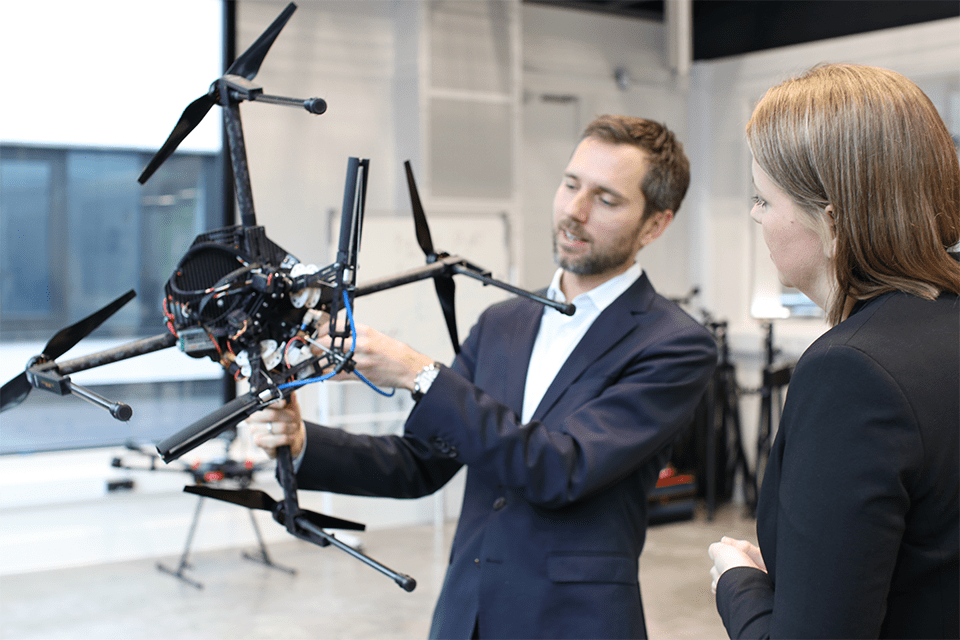A draft bill due to be introduced to the UK parliament in the spring will result in mandatory registration for drone pilots and give police greater powers when dealing with rogue UAVs.
Following proposals put forward in the summer, the UK legislative system is slowly kicking into gear to redefine drone regulations for hobbyists and professionals. Mandatory registration and enforced altitude limits are expected to come into effect in the spring.
The draft bill will also give law enforcement more power to prevent the unsafe or criminal use of drones. A statement from the UK Department for Transport says that “the measures are intended to allow drone users to continue flying safely and legally, helping to place the UK at the forefront of the fast-growing drone industry. This will also pave the way for the devices to be harnessed for a range of uses by businesses and public services.”
The Incoming UK Drone Laws
The focus of the announcement from the Department for Transport was very much on new police powers. It will give officers the right to order operators to ground drones where necessary, as well as the power to seize drone parts to prove it has been used to commit an offence.
These measures are in response to the high number of near-misses between drones and manned aircraft, particularly around airports in London.
Registration and Enforced Application Use?
In news that’s been expected for some time, measures will make it mandatory for drone owners to register their aircraft to improve accountability if their drone weighs 250 grams or more. But in a stranger, more vague statement, the DoT said that “drone operators will be required to use apps – so they can access the information needed to make sure any planned flight can be made safely and legally.”
It’s not yet clear how this practice could be enforced. The UK’s Civil Aviation Authority’s Drone Assist app would be the likely candidate. But the statement also repeats the notion that the UK government expects cooperation from manufacturers. So perhaps we will see more safety steps included in DJI Go, for example.
The draft bill is also expected to ban drones from flying near airports or above 400 feet.
UK aviation minister Baroness Sugg said that “Drones have great potential and we want to do everything possible to harness the benefits of this technology as it develops.”
“But if we are to realise the full potential of this incredibly exciting technology, we have to take steps to stop illegal use of these devices and address safety and privacy concerns. These new laws strike a balance, to allow the vast majority of drone users to continue flying safely and responsibly, while also paving the way for drone technology to revolutionise businesses and public services.”

The main points of the expected legislation are:
- Drone users will have to sit safety awareness tests
- Users of drones weighing 250 grams and over will in future have to be registered
- The government is also working closely with drone manufacturers to use geo-fencing to prevent drones from entering restricted zones.
National Police Chiefs’ Council Lead for Criminal Misuse of Drones, Assistant Chief Constable Serena Kennedy had this ominous warning for rogue pilots:
“Police forces are aware of the ever increasing use of drones by members of the public and we are working with all relevant partners to understand the threats that this new technology can pose when used irresponsibly or illegally. Do not take this lightly – if you use a drone to invade people’s privacy or engage in disruptive behaviour, you could face serious criminal charges.”
Read more: Collisions: How to Break the Cycle of Conjecture, Fear & Drone Negativity
The Cost of the Minority
Unfortunately for the majority of UK drone pilots, the actions of a minority have led to a negative media and public perception of drone technology. Near misses seem to be reported at London’s Gatwick and Heathrow airports every other day, and there have been several high profile cases of illegal flights over sporting events.
That one-sided point of view carried into official research sponsored by the Department for Transport and the British Airline Pilots Association (BALPA) in the summer. As we reported then, the collision study these new regulations are based on was flawed at best and appeared to be engineered to come to certain conclusions.
Mandatory registration and safety tests (which will likely be online) are seen as more acceptable in the UK than in the US. But there’s still a sense that the weight limit is a figure with no factual basis, and that this is just the beginning as skies are prepared and prioritized for more ambitious commercial drone programs.
There’s also the concern that registration will be – like the Permit for Commercial Operations (PfCO) – difficult to enforce and near-impossible to police.
In general though, safety awareness and increased accountability can only be a good thing – perhaps reminding pilots during tests and ensuring they use applications such as Drone Assist will keep rogue drones out of the headlines. Let’s see how things turn out.
Malek Murison is a freelance writer and editor with a passion for tech trends and innovation. He handles product reviews, major releases and keeps an eye on the enthusiast market for DroneLife.
Email Malek
Twitter:@malekmurison
Subscribe to DroneLife here.







[…] Read more: Incoming UK Drone Laws: What You Need To Know […]